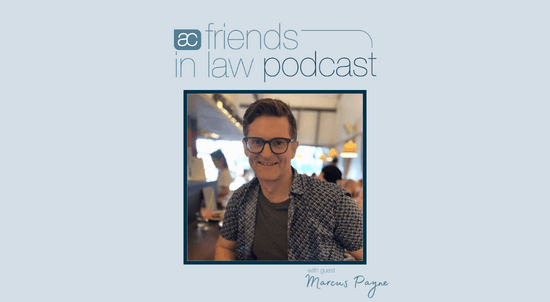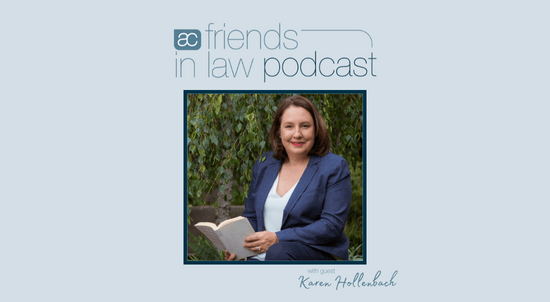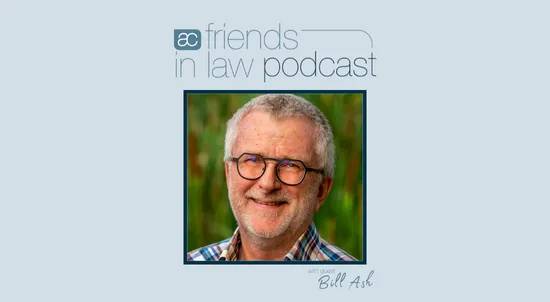
Some lawyers we have come across in our time as a specialist industry recruiter have expressed a reluctance to have a presence or to be active and take part in conversations that are happening on LinkedIn. In our recent Friends in Law podcast interview with Karen Hollenbach, LinkedIn training specialist and founder of Think Bespoke, she explains how that can be short sighted when it comes to your career over the long term.
Karen says, “We often collaborate with Lawyers who have seen colleagues who are not as competent as them, shining brighter on LinkedIn than they do. Under-representing yourself online can be a career limiting move. Whilst comparisons are not necessarily helpful, you are doing yourself a disservice if you do not at least have a presence on the biggest professional networking platform in the world.”
By optimising your profile, which means keeping it up to date, including relevant keywords and ensuring you are correctly linked to your current employer and historical employers, it acts as your 24 hour a day, 7 days a week personal brand ambassador. Some lawyers say that their work should speak for itself- but people will always research you online when they are considering working with you, connecting with, or hiring you. Wouldn’t you rather control what it is that they find about you online?
In this day and age, your next employer, your next client and potentially even your next dream job will find you online, and in most instances, this will be either via your company website or LinkedIn. Whilst putting yourself online can feel uncomfortable, it is a valuable investment of your time and energy. Karen suggests getting comfortable with the uncomfortable. The reality is that humans connect with humans and seeing an image of someone they know on LinkedIn tends to get a positive response.
By having an accurate and up to date profile, you help reduce the risk for someone in their journey to work with you or to buy your services. They are able to do part of their due diligence online and understand your values and how you conduct yourself by researching your profile. This ultimately helps prospective employers, suppliers and even clients understand if you are for them and saves you time convincing them in the long run!
Getting Started
The first thing to do when you are getting comfortable with LinkedIn is to consider your goals for the platform. Once you understand your goals, LinkedIn can really help you get there faster. Karen tends to ask attendees at her LinkedIn workshops two questions.
- What do you want to be known for?
This might be your topic of subject matter expertise, or the type of law you specialise in. It also factors in how you conduct yourself professionally.
2. Who do you want to influence on LinkedIn?
This relates to who you are connected to, and the conversations you engage in on LinkedIn.
Once you have answered for yourself these two questions, then you are ready to delve into your LinkedIn personal profile.
Profile Basics
Your profile should be connected to your personal email address. This is so that when you no longer work for an employer, you still have the ability to access and edit it. Should you end up with multiple or duplicate profiles connected to old work email addresses, reach out to LinkedIn to have them merge them for you. If you are worried about having a personal email address on your profile for privacy reasons, you can select settings in LinkedIn that make it private. Instructions on how to do so are here.
At a minimum, your profile should have:
- A professional looking photo. (Not a holiday snap, no wedding pictures, and no pets included please). You will get between 14-20 more profile views with a photo.
- A headline that details your current role, where you are working, the industry you specialise in. If you are an advocate for a cause, include this in your headline. You get 260 characters to tell your story and what you stand for.
- An about section that includes details around who you help, the problem you solve and what action people should take once they have read your profile. You get 2600 characters to do this in an engaging way written in the first person.
- Featured section: This allows you to link back to articles you have published, PDF resources, podcasts etc.
- Education: Include any degrees and post graduate qualifications
- And then the chronological history of your employment which should reconcile back to your CV.
For Employers – how to test accuracy of a profile
For some employers, a LinkedIn profile of a prospective employee can sound too good to be true. You are after all the author of your own headline, summary and about section and have free reign to include what you like.
Having said that, profiles are easily fact checked back to CV’s, company website. Common connections can be investigated, and skills and experience can be verified.
Karen suggests prospective employers should be wary of profiles that have scant employment history and little or no endorsements, connections, or recommendations.
What does it mean to be active on LinkedIn?
Karen says, whilst this is not for everyone, if you plan your activity strategically and in line with your goals it can help you get into conversations with those you want to influence. When deciding your activity levels, you should consider your capacity and ability to be consistent.
At the very least, consider being an unofficial cheer squad. Cheer your colleagues from the sidelines when they post updates and share news. You can move causes forward by liking, sharing and even sharing posts privately to your connections via LinkedIn messages.
The LinkedIn algorithm means that you connections will not see all your updates.
Curate Your Newsfeed
You will get more out of LinkedIn if you keep it relevant. Review the companies, groups, and connections you are following. Are they all relevant and of interest? Cull those that are not adding value to your LinkedIn experience. This curation of your news feed will help keep you informed about the things that you are interested in and remove some of the noise.
Ensure that your notification and communication settings are as you want them to remove any unnecessary e-mails or distractions.
Thought Leadership
An active presence on LinkedIn does lend itself to the concept of thought leadership. This is for the braver among you, who are prepared to express an opinion, add value and share relevant industry updates. This is an optional extra and entirely up to you based on your comfort level.
You do not have to be a published author to be a thought leader on LinkedIn. Karen suggests that society is moving away from believing the “organisational voice” and is instead more interested and convinced by the crowd sourced voices of employees, connections, colleagues, and friend. More interested in the “word of mouth”
If thought leadership on LinkedIn is of interest to you, you could activate creator mode on your profile. This allows you to select and to be known for the 3 or 4 topics you are interested in. These topics are then served up to you to comment on in a value adding manner via your news fee.
And for those of you who are actively job searching…
Ensure that your resume and LinkedIn profile tell the same story. They need to be consistent but are not the same things. Your resume or CV is a formal document that is specifically related to the job you are applying for. Your LinkedIn profile is a more general statement of professional purpose. It should give a reader an overall sense of you as a legal industry professional and a chronological order of where you have worked.
Having a professional, current and compelling presence on LinkedIn is the modern version of having an accurate business card. It helps you be discovered online and works for you even when you are otherwise occupied. Getting comfortable with having an online presence is as important as having a current CV and a good reputation.
This interview was first published in our #FriendsInLaw podcast. To hear more episodes of this series that brings your career stories, challenges and highlights from the legal profession, you can subscribe here.
Related Articles






Alex Correa Executive is one of Queensland's leading specialists in HR and legal recruitment consulting.
NAVIGATION
QUICK LINKS
Alex Correa Executive respectfully acknowledges the Turrbul people, Traditional Custodians of the land which we live and work, and pay our respects to elders, past, present and emerging. We extend that respect to all Aboriginal and Torres Strait Islander peoples.




